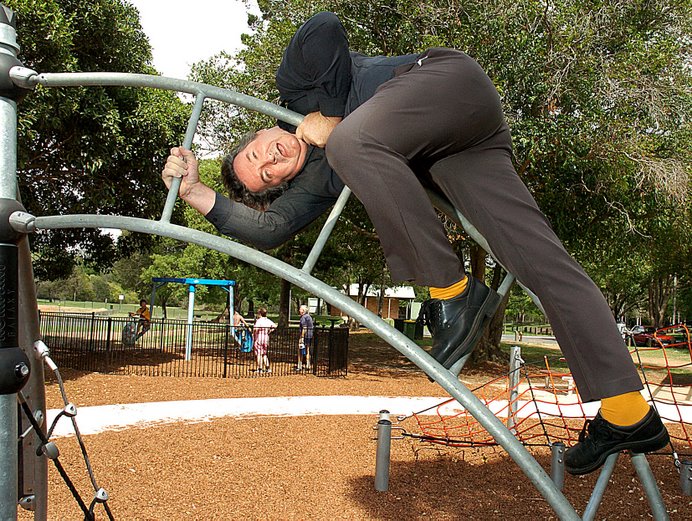I think they should be one or two lines rather than full stanzas, because brevity is the eternal soul of wit. But that's up to you.
1. Substitute you for my mom;
At least I'll get my washing done.
From Substitute by The Who.
2. Dialing for Dollars is waiting to find me.
I wait for delivery each day until 3.
From Mercedes Benz by Janis Joplin
3. An' tell me, over and over again, my friend,
You don't believe we're on the eve of destruction
From The Eve of Destruction by Barry McGuire.
4. And run, if you will, to the top of the hill, pretty Jean.
From Jean by Oliver.
5. Get up, stand up for your rights.
Don't give up the fight.
From Get Up, Stand Up by The (Original) Wailers.
6. Don't it always seem to go
You don't know what you got 'til it's gone.
From Big Yellow Taxi by Joni Mitchell.
7. There's room at the top, they're telling you sti-il
But first you got to learn how to smile as you ki-ill.
From Working Class Hero by John Lennon.
8. Say it in bro-oken English.
From Broken English by Marianne Faithful.
9. Wake me up when September's gone.
(It lacks timelessness but it's perfect for our times.)
From Wake Me Up When September's Gone by Green Day.
10. Watch the butcher shine his knives
And this town is full of battered wives.
From The Streets of Your Town by The Go-Betweens.
I've left out Dylan, Zappa, Eminem, Rodriguez, Patti Smith, Neil Young, Carole King, Billy Bragg, Paul Kelly, Eric Burdon, Iggy Pop, The Beatles, The Doors, The Rolling Stones, Steppenwolf, The Grateful Dead, Velvet Underground, Talking Heads, AC/DC, The Clash, Dire Straits, R.E.M., U2, Crowded House, NWA, Faith No More, Nirvana, and so many more. What have I done?
Spread the news,
Bernie
Sunday, September 30, 2007
Monday, September 17, 2007
From genre to v. good
WHENEVER you feel you might be writing something hardly worth reading, you can always quote American author Gore Vidal.
Vidal said: 'American writers want to be not good but great; and so are neither.'
I wonder whether Vidal was commenting also on American foreign policy since that country long ago dumped the philosophy of isolationism into history's dustbin. A monstrous heroic adventure is easy to justify in terms of greatness, while finding the goodness in doing the right thing can be a pains-taking task.
Thankfully, I am not pursuing such weighty moral questions here, but glancing at what makes good writing.
My novel Iraqi Icicle is from the detective thriller genre which began with the works of Raymond Chandler last century after World War I. I have tried to transcend the genre to make my novel good, or, I hope, verging on the very good.
Genres rarely rate much above a pass mark from critical judges. In many cases, you can see why. Thriller writers, even the best of them, tend to attain their loyal following by repeating a winning formula. We have the hugely ironic situation that most of the world's leading novelists achieve fame and fotune by producing books which are not novel; which are, in fact, the antithesis of newness. Their successful novels should be called repetitives. Don't miss Dan B. Rowling's latest blockbuster repetitive.
I believe this phenomenon of successful writing is tied to readers' comfort in the known rather than being a shortcoming of genres.
My favourite analogy on this topic is the career of British rock group The Beatles who started as imitators of the American genre, rhythm&blues. That was 1950s R&B, not the modern one where young Black, and sometimes, White women sing out loud on a beach or on the street where they just happen to have 33 people dancing sexily behind them.
The Beatles transcended their choice of genre to produce greatness. I would like to do that with the detective thriller genre. Only, remembering Vidal's warning, I am only after very goodness.
Irai Icicle is available in Europe and the Americas from www.Amazon.com www.Abebooks.com www.Alibris.com and www.Borders.com and www.lulu.com and www.lulu.com/uk and in Autralia and Asia from www.digitalprintaustralia.com
Spread the news
Bernie
Vidal said: 'American writers want to be not good but great; and so are neither.'
I wonder whether Vidal was commenting also on American foreign policy since that country long ago dumped the philosophy of isolationism into history's dustbin. A monstrous heroic adventure is easy to justify in terms of greatness, while finding the goodness in doing the right thing can be a pains-taking task.
Thankfully, I am not pursuing such weighty moral questions here, but glancing at what makes good writing.
My novel Iraqi Icicle is from the detective thriller genre which began with the works of Raymond Chandler last century after World War I. I have tried to transcend the genre to make my novel good, or, I hope, verging on the very good.
Genres rarely rate much above a pass mark from critical judges. In many cases, you can see why. Thriller writers, even the best of them, tend to attain their loyal following by repeating a winning formula. We have the hugely ironic situation that most of the world's leading novelists achieve fame and fotune by producing books which are not novel; which are, in fact, the antithesis of newness. Their successful novels should be called repetitives. Don't miss Dan B. Rowling's latest blockbuster repetitive.
I believe this phenomenon of successful writing is tied to readers' comfort in the known rather than being a shortcoming of genres.
My favourite analogy on this topic is the career of British rock group The Beatles who started as imitators of the American genre, rhythm&blues. That was 1950s R&B, not the modern one where young Black, and sometimes, White women sing out loud on a beach or on the street where they just happen to have 33 people dancing sexily behind them.
The Beatles transcended their choice of genre to produce greatness. I would like to do that with the detective thriller genre. Only, remembering Vidal's warning, I am only after very goodness.
Irai Icicle is available in Europe and the Americas from www.Amazon.com www.Abebooks.com www.Alibris.com and www.Borders.com and www.lulu.com and www.lulu.com/uk and in Autralia and Asia from www.digitalprintaustralia.com
Spread the news
Bernie
Wednesday, September 12, 2007
Drugs 'n' sex `n' rock `n' roll
BLUES-rock diva Janis Joplin liked to shout at her concerts that drugs 'n' sex `n' rock `n' roll would get us well; would get the whole world well.
Joplin died of a heroin overdose at the age of 27.
Janis was not around Brisbane between 1986 and 1992, the setting and time frame of Queensland journalist Bernie Dowling's first novel Iraqi Icicle. But drugs `n' sex `n' rock roll certainly were. In spades. Along with war.
In October 1970, when Janis died, heroin was an international scourge and America and its allies were prosecuting the Vietnam War.
In January 1991, heroin was an internatonal scourge and America and its allies were prosecuting the first Iraq War, also called the Persian Gulf War.
Janis Joplin rates a passing reference in Iraqi Icicle, a private detective thriller with an unlikely sleuth, Steele Hill, an orphan who claims to be John Lennon's love child and lives for gambling and altrnative rock music.
``I am interested in how popular culture, such as music, film, television, theatre, the internet, gambling and even drug use, intersects with mega social events,'' Dowling says.
Brisbane rock band the Go-Betweens is a symbolic character with the novel asking why the Aussie alternative guitar popsters never gained the success of their American contemporaries R.E.M. or even Britband The Smiths.
A Go-Betweens gig at the University of Queensland is in the mix as well as the destruction of Brisbane's hilltop rock concert venue Cloudland where the Go-Betweens supported Brit ska band Madness in the early 1980s.
The novel questions whether rock music lived up to Joplin's boast of it changing the world.
Whenever he drives by, Steele Hill shakes his fist at the yuppie white apartments which replaced Cloudland and he says the Go-Betweens wrote a song about the ballroom's demolition.
He is referring to a few lines from the band's most successful single The Streets of Your Town.
Dowling's novel never leaves Greater Brisbane but it includes Steele Hill's take on the rock music mythology of the 1989 American invasion of Panama.
The pretext for the action was to bring Panamanian president Manuel Noriega to justice for drugs and arms trading.
The international media reported, with varying degrees of accuracy, how American troops blasted rock music at the Vatican embassy where Noriega had refuge before he surrendered.
Steele Hill calls it ``rock's part in Manny's downfall'' and suggests Noriega begged the invaders to stop the music. ``No more Twisted Sister; no more We're Not Gonna Take It,'' Steele Hill imagines Noriega pleading.
Iraqi Icicle is a darkly humorous novel of a period which saw the explosion of personal computers and mobile phones in Australia, and, in Queensland, the Fitzgerald Inquiry into police corruption which toppled the long-serving Joh Bjelke-Petersen government.
Iraqi Icicle is available from www.digitalprintaustralia.com www.amazon.com www.abebooks.com www.alibris.com www.lulu.com/uk and www.borders.com
Joplin died of a heroin overdose at the age of 27.
Janis was not around Brisbane between 1986 and 1992, the setting and time frame of Queensland journalist Bernie Dowling's first novel Iraqi Icicle. But drugs `n' sex `n' rock roll certainly were. In spades. Along with war.
In October 1970, when Janis died, heroin was an international scourge and America and its allies were prosecuting the Vietnam War.
In January 1991, heroin was an internatonal scourge and America and its allies were prosecuting the first Iraq War, also called the Persian Gulf War.
Janis Joplin rates a passing reference in Iraqi Icicle, a private detective thriller with an unlikely sleuth, Steele Hill, an orphan who claims to be John Lennon's love child and lives for gambling and altrnative rock music.
``I am interested in how popular culture, such as music, film, television, theatre, the internet, gambling and even drug use, intersects with mega social events,'' Dowling says.
Brisbane rock band the Go-Betweens is a symbolic character with the novel asking why the Aussie alternative guitar popsters never gained the success of their American contemporaries R.E.M. or even Britband The Smiths.
A Go-Betweens gig at the University of Queensland is in the mix as well as the destruction of Brisbane's hilltop rock concert venue Cloudland where the Go-Betweens supported Brit ska band Madness in the early 1980s.
The novel questions whether rock music lived up to Joplin's boast of it changing the world.
Whenever he drives by, Steele Hill shakes his fist at the yuppie white apartments which replaced Cloudland and he says the Go-Betweens wrote a song about the ballroom's demolition.
He is referring to a few lines from the band's most successful single The Streets of Your Town.
Dowling's novel never leaves Greater Brisbane but it includes Steele Hill's take on the rock music mythology of the 1989 American invasion of Panama.
The pretext for the action was to bring Panamanian president Manuel Noriega to justice for drugs and arms trading.
The international media reported, with varying degrees of accuracy, how American troops blasted rock music at the Vatican embassy where Noriega had refuge before he surrendered.
Steele Hill calls it ``rock's part in Manny's downfall'' and suggests Noriega begged the invaders to stop the music. ``No more Twisted Sister; no more We're Not Gonna Take It,'' Steele Hill imagines Noriega pleading.
Iraqi Icicle is a darkly humorous novel of a period which saw the explosion of personal computers and mobile phones in Australia, and, in Queensland, the Fitzgerald Inquiry into police corruption which toppled the long-serving Joh Bjelke-Petersen government.
Iraqi Icicle is available from www.digitalprintaustralia.com www.amazon.com www.abebooks.com www.alibris.com www.lulu.com/uk and www.borders.com
Subscribe to:
Posts (Atom)


